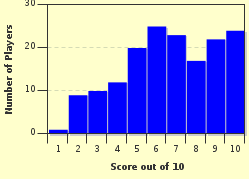Quiz Answer Key and Fun Facts
1. How does the title of Christopher Marlowe's play, "The Jew of Malta", serve to reinforce the Jewish stereotype of Elizabethan England?
2. "The Jew of Malta" opens with a stereotypical Elizabethan representation of the Jew as a figure of Satan. Machiavelli speaks the prologue, and establishes an immediate connection with the character of Barabas. Thus Barabas enters "in his Counting-house" with heaps "of gold before him". But in what way is this opening different than Shakespeare's "Merchant of Venice"?
3. In "The Merchant of Venice", the Christian gentleman, Antonio, willingly lends money without security, despite risking his own life by giving a bond to Shylock for a pound of his own flesh. Yet his response to Bassanio's request for help is both immediate and generous. He declares his purse "all unlocked". How exactly is the love and friendship that governs the lives of Shakespeare's Christian gentlemen, significant to the story of Shylock?
4. In "The Merchant of Venice", Shylock's first words are of ducats.
5. Similarly to Shakespeare's Shylock, Marlowe's Barabas immediately presents himself as an avaricious Jew, with a clearly insatiable appetite for "Beauteous rubies" and "seld-seen costly stones". His most violent reaction is at the loss of his wealth to the Governors of Malta, for the "tribute money of the Turks" is to be "levied amongst the Jews". They are given three options, the first of which is "to pay one half of his estate". But what is the second option?
6. In "The Merchant of Venice", Shylock registers far less grief at the loss of his daughter, than at the loss of his gold. Running through the streets, he remonstrates against the theft of the "double ducats, stol'n from" him by his daughter, which is highly reminiscent of which scene from Marlowe's "Jew of Malta"?
7. In "The Jew of Malta", fearing that Abigail knows of his involvement in the deaths of her suitors Lodwick and Mathias, Barabas poisons her along with the entire convent, "with a mess of rice porridge".
8. What are the names of the two friars that Barabas tempts with the thought of his own "chests of gold, in bullion and in coin" which reveals the hypocrisy and greed of these two Christians?
9. From which play does the line, "Certainly the Jew is the very devil incarnation" come from?
10. At the end of "The Jew of Malta", Barabas dies in a boiling cauldron. What does this cauldron represent, metaphorically?
Source: Author
poshprice
This quiz was reviewed by FunTrivia editor
LeoDaVinci before going online.
Any errors found in FunTrivia content are routinely corrected through our feedback system.

